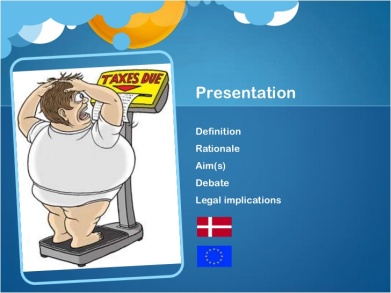- The first ever fat-tax in Europe was imposed by Denmark in September 2011, oblidging Danes to pay an extra 0.41 euros on each pack of butter, 0,11 euros on a pack of crisps, and an extra 0,18 euros on a pound of mince, as a result of the tax. The tax was levied at 2.5 per Kg of saturated fat at the point of sale from wholesalers to retailers.
- France, since then, also applied the fat tax, with taxing, also, sauces (ketchup and mayonnaise), as well as soft-drinks with high sugar concentrations, exempting light and zero-percent-sugar soft-drinks.
- Hungary on October 2011, imposed a tax is on all packaged foods containing unhealthy levels of sugar, salt, and carbohydrates, as well as products containing more than 20 milligrams of caffeine per 100 milliliters of the product.
- Hungary and France are taxing foods that have more than 2.3% saturated fat.
In those countries, the tax was said to be imposed so as to protect the citizens against obesity. A study by Mike Rayner’s group at the UK, Director of Oxford University’s Health Promotion Research Group, had said since the year of 2007 that a combination of taxes on healthy foods and tax breaks on fruit and vegetables could save 3,200 lives a year in the UK.
Greece, welcome your perfect olive oil .So cheap in here, so expesnive abroad
But Greece does seem to urgently need the tax, not only for the apparent two reasons, of the protection of citizens’ health and the collection of some hundreds millions. It is the (almost) forgotten asset of the Greek olive oil, that is ideally boosted by this tax to be promoted more and more, by its usage within the households and also on the Greek restaurant industry.This could make the popular Greek food even more valuable to all tourists and visitors, making more clear that restaurants will be “clean of trans fats and have their menus based on olive oil”. And also, it gives a chance to protect the malnourished Greek mass from -cheaper coming to the stores otherwise-, unhealthy trans fat based products. Let’s not forget the 2006 NYC ban of the use of artificial trans fats in foods in restaurants and other eateries as well as required chain restaurants to post the calorie amounts in their food.
Third reason that we urgently need this tax is coming from the obesity rates in the Greek popuation in comparison with the average European rates , which multiply threatens the Health of the Greeks under the Greece’s Great Depression Times.
According to OECD, 1 in 10 Danes are obese, when in Greece the percentage reaches 22%, while the EU average stands at 15%.
Greece, is not only of the most stressed countries in the world and Europe, by the augmented austerity- stress level causing thousands of deaths yearly, but faces due to austerity also, the Health servises degradation that contributes to the increase of cardiovascular deaths.
In the States, “Sin-tax ” of tobacco
This type of “sin tax” first worked in reducing the consumption of tobacco products over the last decade. High tobacco taxes significantly reduced cigarette smoking and other tobacco use. When President Obama raised federal tobacco taxes by 62 percent days after he took office, the numbers of smokers have since decreased by 3 million, and the US Treasury raised more than $30 billion in new revenue.
In the States, Fat- tax since 2015 , trans-fat ban since 2006
In the USA, California is the first of the United States who applied ‘fat’ tax since the start of 2015, to purchases made of butter, milk, cheese, pizza, candy, soda and all processed food if the item contains more than 2.3% saturated fat.
Lobbyists with the Organic Consumers Association, crafted the ballot measure working closely with First Lady Michelle Obama’s #LetsMove program,, with the aim, a majority of taxes collected to go to obesity education, preventative counseling and support groups, and a percentage of the funds to go to work and housing programs for the state’s exploding immigrant population.
The latest proposal involving a “fat tax” was made in Nevada, when legislation was proposed to impose a 5-cent tax on fast-food items containing more than 500 calories.
According to Oliver Mytton, a researcher for the British Heart Foundation’s Health Promotion Research Group, junk foods need to be taxed at least 20% to have a significant effect on obesity and cardiovascular disease. Additionally, his studies have found that taxes on a wide range of unhealthy foods and ingredients are more effective than narrow fat taxes.




You must be logged in to post a comment.